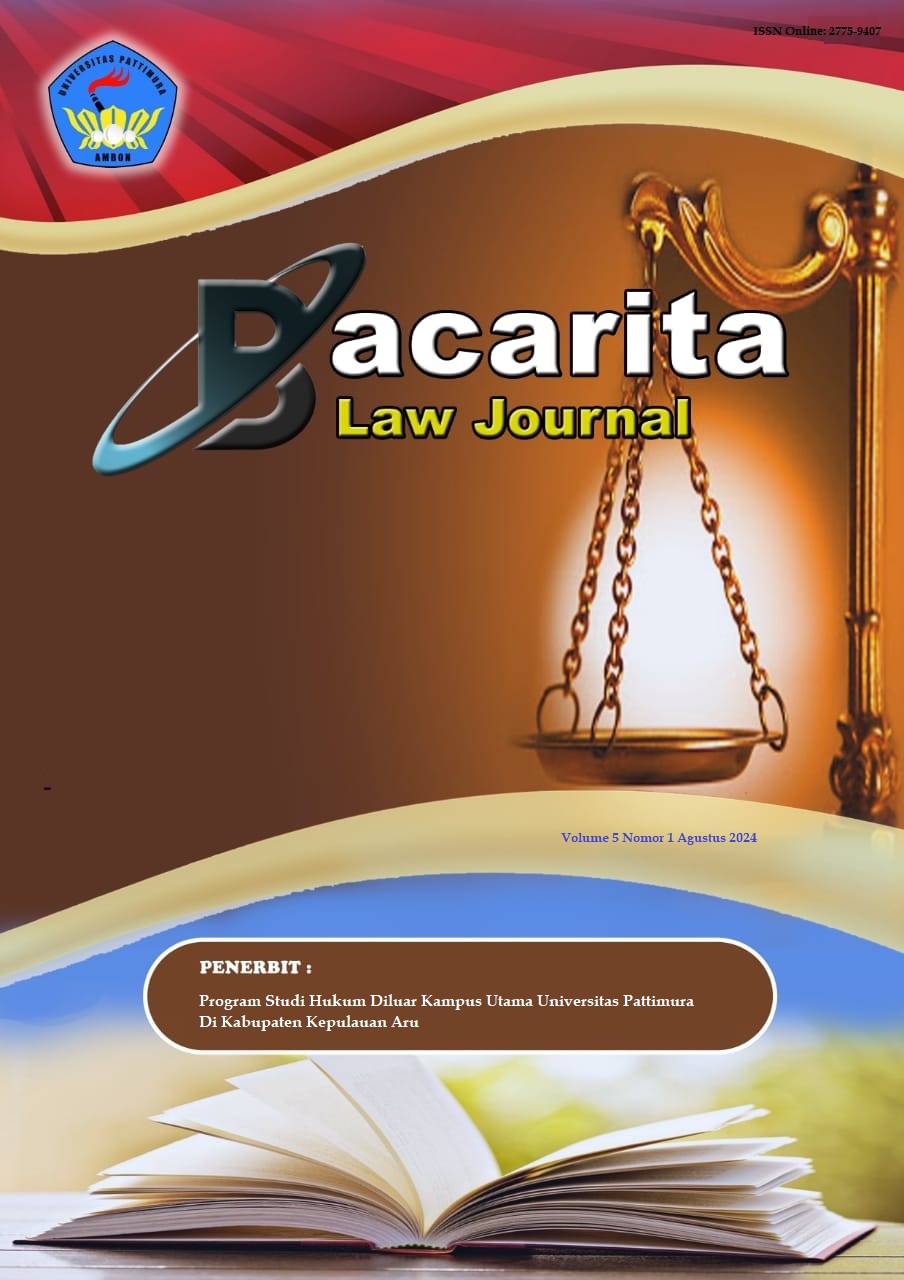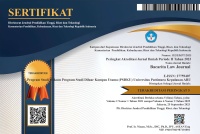Penegakan Hukum Tindak Pidana Perdagangan Orang Di Wilayah Hukum Polresta Pulau Ambon Dan Pulau-Pulau Lease
Abstract
TPPO cases that have occurred in the last 3 years in the jurisdiction of the Ambon Island Police and Lease Islands have increased. In 2021 there will be 3 cases, in 2022 there will be 5 cases, and in 2023 there will be 6 cases. On average, TPPO victims handled from 2021 to 2023 came from Maluku and outside Maluku. Various efforts have been made by the Ambon Island and Lease Island Police, including through law enforcement by applying strict criminal sanctions to perpetrators as regulated in Law no. 21 of 2007 for handling TPPO in its jurisdiction. This research uses an empirical juridical research method which is descriptive analysis, with data obtained through literature study and interviews, then the data is analyzed qualitatively to obtain legal certainty regarding law enforcement of criminal acts of human trafficking in the jurisdiction of the Ambon Island and Lease Island Police. Based on the research results, it was found that TPPO cases that occurred in the jurisdiction of the Ambon Island Police and Lease Islands were caused by several factors, including economic factors, lack of attention from the family, the lure of jobs with high salaries, and current lifestyle competition. This problem is used by perpetrators to recruit victims to gain profit. The victims were from Maluku and outside Maluku. There are those who are employed in karaoke rooms in Ambon City and there are also those who are used as prostitutes who are ordered online via the Michat application. In order to deal with this crime, the Ambon Island and Lease Island Police took law enforcement action against the perpetrators of TPPO. However, law enforcement is influenced by 2 factors, namely internal and external factors. Furthermore, enforcement of the TPPO law at the Ambon Island and Lease Island Police was carried out in the form of repressive measures so that 14 cases from 2021, 2022 and 2023 were all escalated to court. This repressive action is carried out as a last resort in enforcing criminal law (ultimum remedium) with the aim of providing a deterrent effect to perpetrators and suppressing the rate of increase in TPPO cases in the future as well as realizing legal certainty, benefit and justice.
Downloads
References
Jurnal
Rahayu Dewi Sri, Monita Yulia, “Pertimbangan Hakim Dalam Putusan Perkara Tindak Pidana Narkotika”, PAMPAS: Journal Of Criminal Law, Vol. 1, No. 1 (2020).
Buku
Ali Mahrus dan Pramono Aji Bayu, Perdagangan Orang, Citra Aditya Bakti, Yogyakarta, 2011.
EloE Sinla Paul, Tindak Pidana Perdagangan Orang, Setara Press, Malang, 2017.
Hamzah Andi, Asas-Asas Hukum Pidana, Rineka Cipta, Jakarta, 2002.
Nuraeny Henny, Tindak Pidana Perdagangan Orang: Kebijakan Hukum Pidana dan Pencegahannya, Sinar Grafika, Jakarta, 2011.
Sudarto. Hukum dan Hukum Pidana., Alumni, Bandung, 1981.
Soekanto Soerjono, Penegakan Hukum, Bina Cipta, Bandung, 1983.
Online/World Wide Web dan Lain-Lain
Media Online, Jumlah Penduduk Menurut Kabupaten/Kota di Maluku (JIwa), 2022-2024, Maluku.bps.go.id, Diakses pada tanggal 2 April 2024, Pukul : 18.45 WIT.
Copyright (c) 2024 Driyano Andri Ibrahim, Elsa Rima Maya Toule, Hadibah Zahra Wadjo

This work is licensed under a Creative Commons Attribution-NonCommercial 4.0 International License.
Authors who publish their manuscripts in this Journal agree to the following conditions:
- The copyright in each article belongs to the author, as well as the right to patent.
- Authors are able to enter into separate, additional contractual arrangements for the non-exclusive distribution of the journal's published version of the work (e.g., post it to an institutional repository or publish it in a book), with an acknowledgment of its initial publication in this journal.
- Authors are permitted and encouraged to post their work online (e.g., in institutional repositories or on their website) prior to and during the submission process, as it can lead to productive exchanges, as well as earlier and greater citation of published work.
- Authors have the right to self-archiving of the article (Author Self-Archiving Policy)















